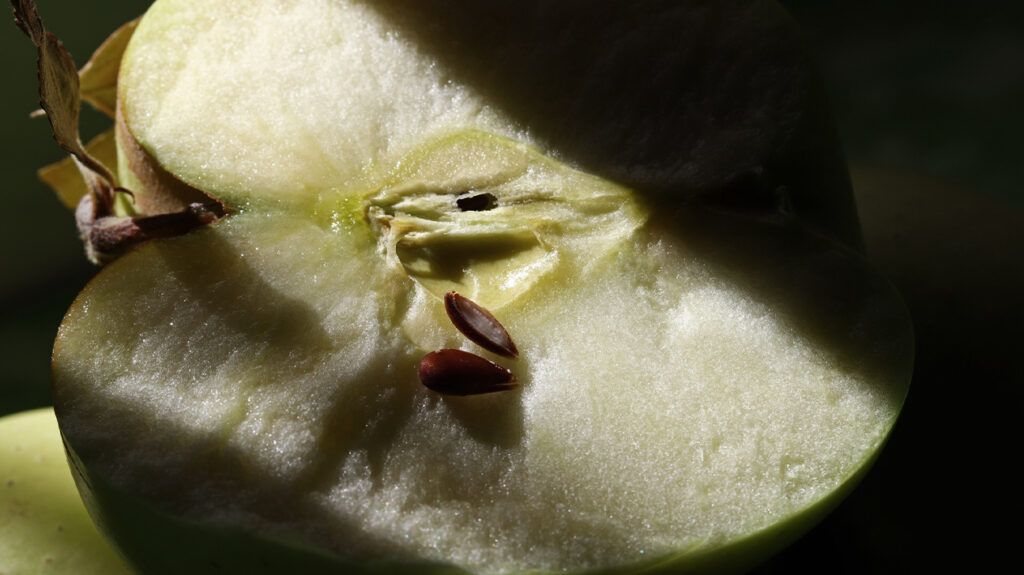Apples can be a healthy snack or ingredient. However, it is not advisable to eat the seeds, as they contain small amounts of a chemical that produces cyanide, which is highly toxic.
Eating one or two apple seeds by accident, or drinking juice that contains a few pulverized seeds, is unlikely to cause problems. But if a person or animal consumes a lot of apple seeds, it could make them sick.
The seeds of other fruits, including apricots and pears, also contain the same chemical. People can eat these fruits safely by avoiding the seeds, pits, or kernels.
If a person has swallowed a lot of seeds, call Poison Control at 1-800-222-1222 or use the POISONCONTROL online tool.
This article explores scientific research into the safety and risks of eating apple seeds.

Yes, apple seeds can be toxic. They contain
Cyanide is very poisonous. However, it is important to note that for there to be any harmful effects, a person would have to eat a significant amount of crushed apple seeds, which is unlikely to occur.
The apple fruit around the seeds is safe to eat and can be part of a healthy diet. Apples contain beneficial antioxidants, vitamins, and dietary fiber.
People have used cyanide as a poison throughout history. It works by interfering with oxygen supply to cells. The symptoms become apparent in
Mild symptoms of cyanide poisoning include:
- dilated pupils
- headaches
- dizziness
- confusion
More severe poisoning can lead to:
- reduced consciousness
- low blood pressure
- seizures
- coma
- death
Eating a few apple seeds is unlikely to cause symptoms. However, eating or drinking large quantities of ground or crushed seeds could result in cyanide poisoning if the dose is high enough.
A lethal dose of cyanide is around 50–300 milligrams (mg). A 2018 analysis of previous research states that a person would have to eat around 83–500 seeds to develop acute cyanide poisoning.
However, the exact amount of cyanide that will make someone sick depends on their body weight and tolerance. The variety of apple and condition of the seeds are also factors.
An older 2015 study of apples in the United Kingdom found that the amygdalin content was highest in the varieties:
- Golden Delicious
- Red Delicious
- Royal Gala
Varieties such as Braeburn and Egremont Russet had the lowest amounts.
Nevertheless, it is probably a good idea to remove the seeds from all apples before giving them to young children or pets.
Apple juice will not contain cyanide if it does not contain pulverized seeds. But if the juice or smoothie contains whole crushed applies, it may contain some amygdalin or cyanide.
A
The products that did not contain cyanide had undergone pasteurization, which is a type of heat treatment that kills germs. Cyanide has a very low boiling point, so heating it causes it to vaporize, reducing the amount in foods.
The 2015 study of apple juices found that the amygdalin content in commercially-available products was low, at between 0.01 and 0.007 milligrams per millileter (mg/mL). The authors conclude that this is unlikely to cause harm, but still recommend removing apple seeds before juicing.
Many other plant-based foods contain cyanide-producing compounds. Previous studies have found
Apples belong to the Rosaceae family of plants, many of which also contain amygdalin in their seeds, pits, or kernels. This includes:
Again, though, it is only the seeds that pose any risk. The fruits are safe to eat.
An exception to this are nuts in the Rosacaea family, such as almonds and cashews, as well as flaxseeds. These foods are in themselves seeds, and so do contain some amygdalin.
However, the species influences how much amygdalin these foods contain. For example, bitter almonds contain
Processing methods are also an important factor. As with apple juice, heating foods that contain cyanide causes the toxin to vaporize, making roasted or cooked almonds safer than raw almonds. A
Apple flesh and peel can be a valuable part of a healthy diet. But chewing or crushing apple seeds releases amygdalin. In the stomach, this compound produces a
People can easily avoid the amygdalin in apple seeds by removing them or eating around them. Choosing apple drinks that have undergone pasteurization is also advisable, particularly for children.
If a person accidentally eats a few apple seeds, it is unlikely to cause any harm. But in sufficient quantities, cyanide-producing compounds from any plant could be risky. Seek help if a person has eaten a large quantity of apple seeds or develops symptoms after eating apple seeds.
